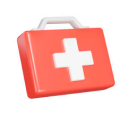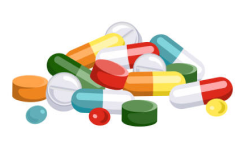Uses
What is Benzodiazepines for?
Benzodiazepines are a class of medicine which includes diazepam, lorazepam, bromazepam, alprazolam, nitrazepam, chlordiazepoxide and clonazepam.
Benzodiazepines are usually used to control seizures and anxiety as well other conditions related to the nervous system.
In particular they are used for the short term treatment of conditions such as:
- Anxiety
- Panic attacks
- Insomnia
- Seizures (fits)
These medicines may be given to you or your child for other reasons. Do check with your doctor what you are taking this for.
How should I take or use Benzodiazepines?
- Take these medicines exactly as prescribed by your doctor. Follow the instructions on the medicines label or as advised by the pharmacist. The dose may be changed by your doctor depending upon your response.
- Do not take this medicine more often than directed by your doctor and if you are required to take these medications long term, do not stop unless instructed by your doctor. Stopping this medicine too rapidly can increase the risk of your symptoms recurring.
- If you are taking these medicines for insomnia, it is recommended to take these medicines before your bedtime.
- Avoid taking alcohol while taking these medicines as this may lead to excessive drowsiness.
- Do not change brands or dosage forms without first informing your doctor.
- If you have been taking these medicines on a regular basis for some time, consult your doctor on the appropriate way to discontinue these medicines. Sudden discontinuation of these medicines may result in symptoms such as increased anxiety, sleep disturbances and headaches. Seek medical attention as soon as possible if such symptoms occur.
- Tablets:
Swallow the tablets whole with a glass of water. If you (or your child, if applicable) are unable to swallow the tablet, you may crush it and add it to small amounts of food (i.e. for children: yogurt, ice-cream, syrup). - Benzodiazepines may be taken with or without food.
- Rectal enema (rectal diazepam):
Please refer to separate information leaflet on rectal diazepam usage.
What should I do if I forget to take or use Benzodiazepines?
- Take the dose as soon as you remember and then continue to take it normally. However, if it is almost time for the next dose, skip the dose missed and take the next dose at the usual time.
- Do not double or increase the dose.
- If you/your child has missed more than two doses or you are not sure of what to do, consult your doctor or pharmacist.
- Always ensure there is at least 2 weeks' supply of medication. If you/your child has less than two weeks medication supplies, please ensure that you have made an appointment with your doctor or arranged to collect more medication.
Precaution
What precautions should I take when taking or using Benzodiazepines?
What do I need to tell my doctor before I take these medicines?
- Drug allergies.
- Pre-existing medical conditions such as lung disease and sleep apnoea (temporary stopping of breathing during sleep).
- Whether you are taking any other medicines, supplements or traditional medicines. Some of them may affect how this medicines works.
- For women: Tell your doctor if you are pregnant or breast-feeding or have plans to become pregnant. If you are pregnant and/or breastfeeding, your doctor would have discussed the potential benefits and side-effects of continuing this medicine with you but should you have further questions or concerns, do consult your doctor.
What food or medication should I avoid when I take or use Benzodiazepines?
Avoid grapefruit or grapefruit products if you/your child has been prescribed with this group of medication.
These medicines may interact with a number of other medicines. Inform your doctor if you are taking or intend to start taking other medicines or supplements.
Side Effects
What are some common side effects of Benzodiazepines?
Generally, the common side effects tend to occur at the beginning of treatment. Such side effects may include:
- Drowsiness, dizziness, fatigue, unsteadiness, memory impairment and difficulty in concentrating. Be careful when taking over-the-counter medicines. Medicines for cold and allergy may add on to the drowsiness. Be sure to supervise your child when he/she is involved in activities such as cycling or swimming.
- Difficulties in breathing, abnormal heart beat
- Increase salivation or drooling (especially with nitrazepam)
- Double vision and blurred vision
- Abdominal pain, nausea, vomiting, diarrhea or constipation. If the medication upsets the stomach, take it with food but do not take it with carbonated drinks.
- Muscle weakness or pain
Inform your doctor if any of the above side effects lasts for more than a few days or if they become serious or bothersome.
Rare but serious side effects may sometimes occur. Contact your doctor as soon as possible if you notice any of the following:
- Hallucinations (hear or see things that do not exist), confusion or impaired consciousness
- Difficulty in breathing or tightness in the chest
- Skin rash
- Unusual behavioural changes such as hyperactivity or mood changes like increased irritability. This includes feeling excitable, over-talkative and disinhibited and/or having intrusive thoughts.
Inform your doctor if you notice any other unusual symptoms. Always discuss with your doctor or pharmacists if there are any problems or difficulties during or after taking benzodiazepines.
Take note that the side effects listed here are not exhaustive. Do seek medical attention if you have other symptoms that you think may be related to these medicines.
Handling
How should I store Benzodiazepines?
- Keep away from children
- Keep in a cool, dry place, away from direct sunlight
- Store at room temperature
How do I throw away Benzodiazepines safely?
Throw away any unused or expired medicines. Consult your medical professional if you are unsure with respect to how to safely dispose of any excess medicines/expired medicines.
For more information
What else should I know about Benzodiazepines?
What are the things I need to know or look out for while on this medicines?
- Check with your doctor or pharmacist if you want to take (or administer) any other medicines, supplements or herbal products in combination with these medicines.
- If used long term your body may adjust to the presence of this medicine and the effect of this medicine may change. Long term use of benzodiazepines should be supervised by your doctor. If the benzodiazepine is required to be stopped after prolonged use, your doctor will usually reduce the dose slowly.
- If you/your child sees another doctor, inform him/her that you (or your child if applicable) is taking benzodiazepines before he/she prescribes any other medicines. Inform your other healthcare professionals (e.g. nurses/pharmacists) that you taking these medicines as well.
- If applicable avoid driving or any other activities that requires concentration until you see how this medicine affects you/your child.
- Taking these medicines along with certain pain killers such as codeine and morphine may lead to side effects. Inform your healthcare provider if you are taking any other painkillers or cough preparations.
- Do not share your medicines with others.
- Consult your doctor or pharmacist if you have any questions about your medicines
Click here for more information on Benzodiazepines as treatment for complex motor disorders in children.
What should I do if I overdose?
If you take/administer more than the dose prescribed by your doctor, consult your doctor or health care professional immediately.
Disclaimers
If you take more than the recommended dose, please seek medical advice immediately. The information provided on this page does not replace information from your healthcare professional. Please consult your healthcare professional for more information.
This article is jointly developed by members of the National Medication Information workgroup. The workgroup consists of cluster partners (National Healthcare Group, National University Health System, and SingHealth), community pharmacies (Guardian, Unity, and Watsons), and the Pharmaceutical Society of Singapore. The content does not reflect drug availability and supply information in pharmacies and healthcare institutions. You are advised to check with the respective institutions for such information.
Contributed by
Last Updated on October 2017

Need More Medicine?
Use Medicine Order Service on HealthBuddy.

Medicines Reminder
Get reminders and chart progress on HealthBuddy.
Related Medicines or Drugs




















